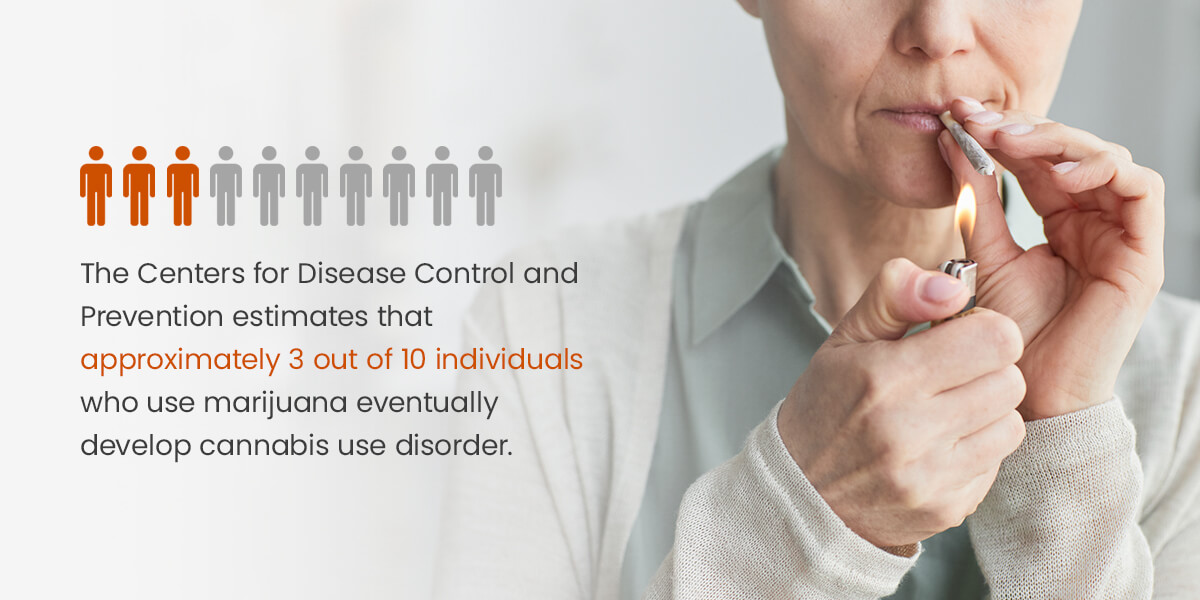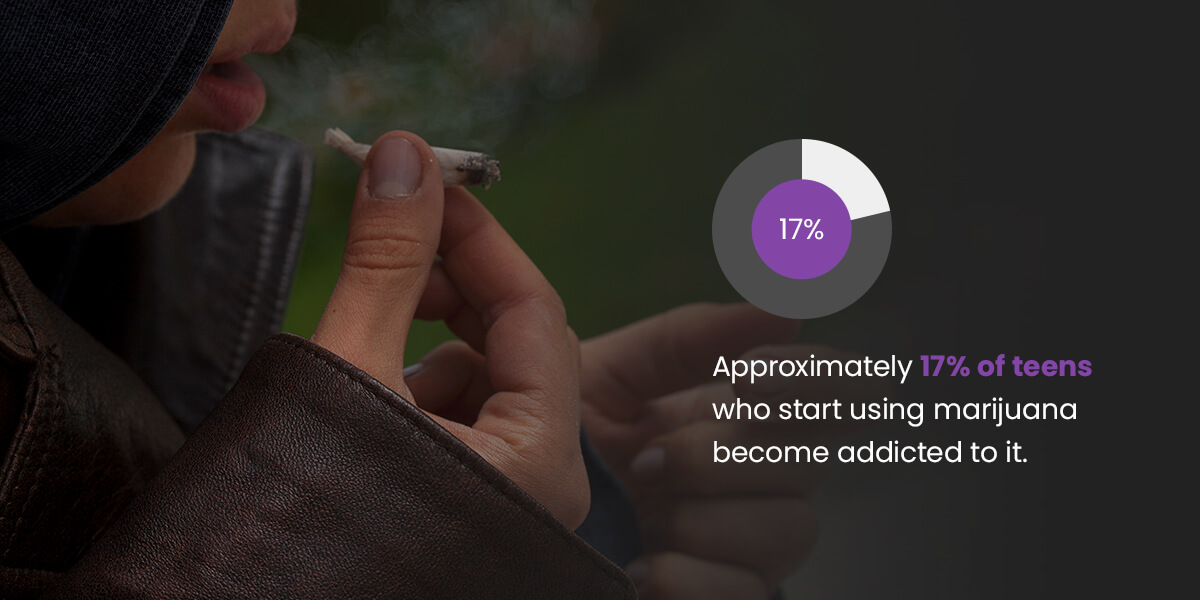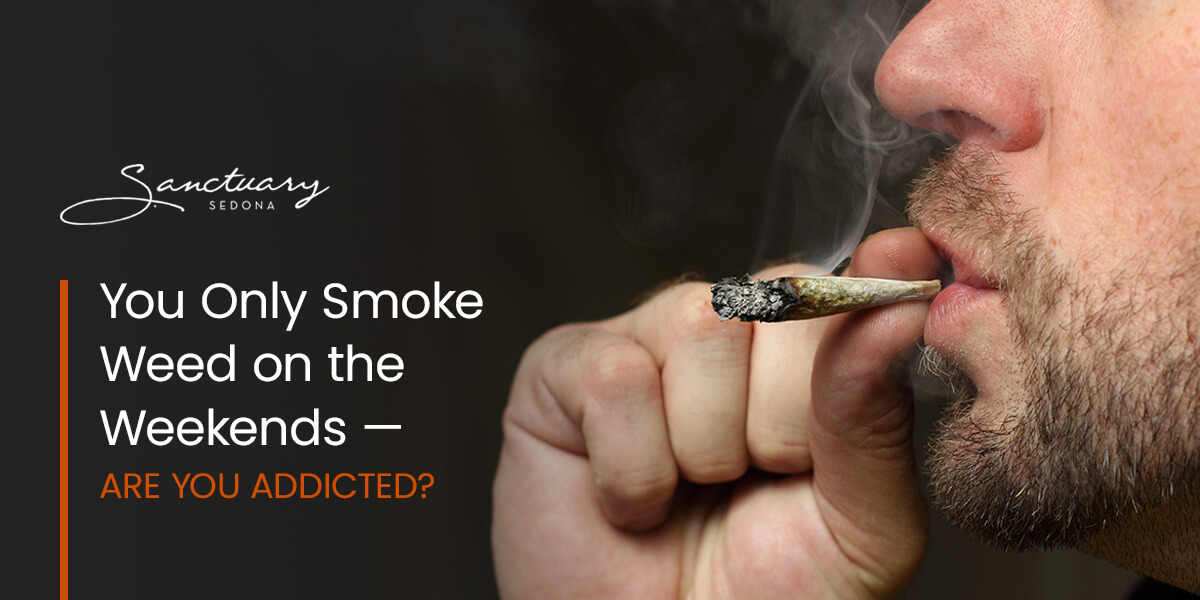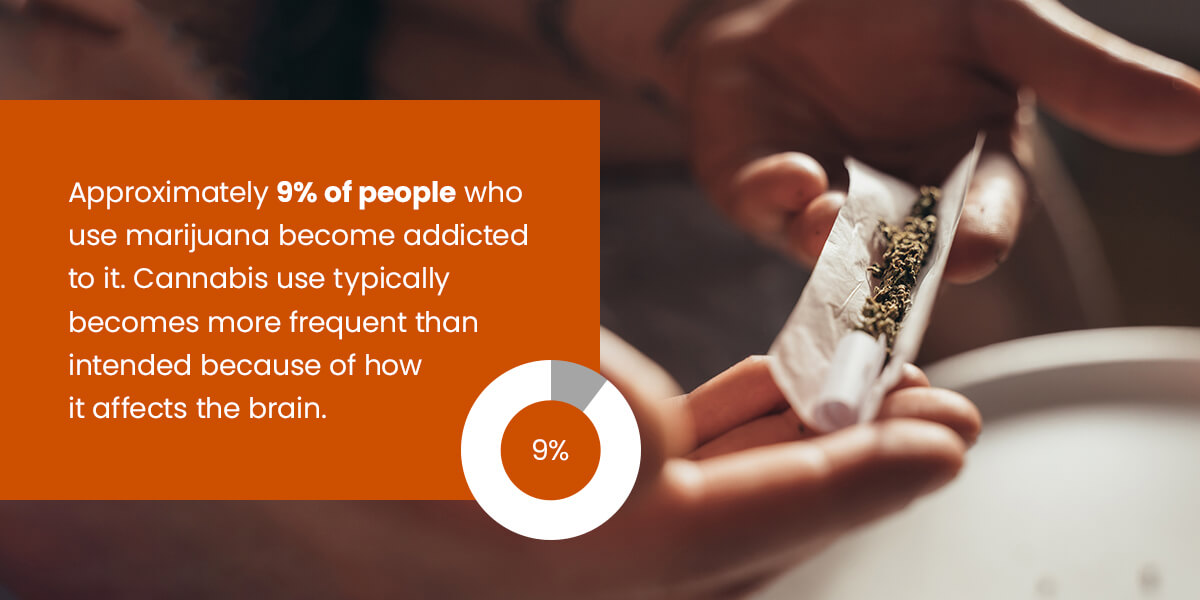I Only Smoke Weed on the Weekends — Am I Addicted?
Marijuana use has increased over the past few decades due to changing legislation and increased social acceptance. As this substance becomes legal for medicinal and recreational use in several states, more individuals use it regularly. While society typically considers marijuana a milder drug than other substances, it still poses a risk for addiction.
Weekend cannabis use can quickly develop into a substance use disorder, so it’s important to recognize the signs of addiction and seek treatment when needed. Consuming weed on the weekends may seem harmless at first, but occasional use may lead to continuous, heavy use over time.
Table of Contents
- Can Casual Use Lead to Cannabis Addiction?
- Short-Term Effects of Marijuana Use
- The Long-Term Impact of Prolonged Marijuana Use
- Why Is Marijuana So Addictive?
- The Dangers of High-Functioning Marijuana Addiction
- Signs of Marijuana Addiction
- Marijuana Withdrawal Symptoms
- Marijuana Addiction Treatment

Can Casual Use Lead to Cannabis Addiction?
Marijuana use has become more common for recreational and medical purposes, and the Centers for Disease Control and Prevention estimates that approximately 3 out of 10 individuals who use marijuana eventually develop cannabis use disorder. A person has a cannabis addiction if they continue using marijuana even when it causes problems and they cannot stop using it.
You can be addicted to marijuana even if you limit your use to the weekends. People who only use marijuana occasionally may assume they are not addicted, but a person can be addicted no matter how often they use a drug. While using large amounts of marijuana typically indicates someone has an addiction, using it over an extended time period is also a sign of addiction.
Smoking or ingesting marijuana on the weekends can develop into dependence, especially if an individual is already dependent on another drug such as tobacco, alcohol or a narcotic.
Short-Term Effects of Marijuana Use
Many people use marijuana because of its calming effect, which can help reduce anxiety and pain, but it also has some negative effects. Marijuana use can negatively impact an individual’s life in the following ways:
- Reduced inhibitions
- Poor coordination
- Slower timing and movements
- Impaired thinking and memory
- Increased heart rate
- Anxiety or panic
- Hallucinations
The Long-Term Impact of Prolonged Marijuana Use
It may seem like marijuana’s side effects dissipate after use, but it can also cause long-term side effects. Individuals who continuously or regularly use marijuana can experience the following impacts:
Cognitive Impacts
Prolonged marijuana use can impact brain development. It hinders the brain’s ability to form connections between certain areas, which impairs learning functions, memory and thinking. These are common short-term effects of using the drug, but they can also become permanent in some cases.
Because marijuana can reduce brain health and slow timing, coordination and movements, it often affects life achievements. Using the drug may hinder an individual’s ability to reach educational and career goals, decreasing their life satisfaction over time.
Long-term use can also cause mental illness symptoms such as paranoia and hallucinations and worsen schizophrenia symptoms.
Physical Impacts
Smoking cannabis can cause lung irritation and breathing complications like smoking tobacco does. Inhaling marijuana smoke increases a person’s risk of developing lung infections and lung illnesses such as chronic bronchitis, pneumonia and hyper-inflated lungs. It can also cause phlegm buildup and a daily cough.
People may associate marijuana with a sense of calm, but it increases a person’s heart rate when they use it. After using marijuana, an individual may experience a rapid heart rate for up to three hours. This is an especially significant risk for elderly individuals and anyone with heart complications.
Some people who use marijuana regularly over an extended time period develop a condition known as Cannabinoid Hyperemesis Syndrome. This condition causes severe dehydration, nausea and vomiting, and some people need to seek medical attention for it.
Using marijuana during pregnancy presents long-term risks to unborn babies. It can impact a fetus’s developing brain and increase the risk of cognitive and behavioral problems following birth, hindering the baby’s problem-solving skills, memory and attention. It can also cause low birth weight.
Why Is Marijuana So Addictive?
While you may intend to use marijuana infrequently such as only on the weekends or for special occasions, you can potentially find yourself using it more frequently. A few weekends can quickly turn into daily use, and you may not notice the challenge until you are already addicted to the substance. Marijuana use typically becomes more frequent because of the following factors:
Brain Effects
Approximately 9% of people who use marijuana become addicted to it. Cannabis use typically becomes more frequent than intended because of how it affects the brain.
Marijuana stimulates the brain’s endocannabinoid neurotransmitters. As marijuana enters the bloodstream and interacts with the brain, the brain’s sensitivity to its neurotransmitters decreases, and it begins to produce fewer of them. As a result, the brain needs increased amounts of the drug for an individual to feel its effects.
When a person uses marijuana, their brain becomes used to it. This reduced sensitivity causes them to crave more so they can feel the effects they desire. They may also begin using it more frequently so they can feel the same high more often. Weekend marijuana use quickly turns into more frequent use, and some individuals may even begin using it daily.
Increased Potency
Marijuana’s increased potency contributes to its addictive features. THC is the substance in marijuana plants that causes psychological and physical effects. Marijuana samples had a THC content of around 4% in the 1990s, but its content exceeded 15% in 2018, making it much stronger. As the substance becomes stronger, the likelihood of people becoming dependent on it increases.
Legality and Social Acceptance
Increased legal and societal acceptance of marijuana also contributes to its frequent use. The substance is legal for medicinal purposes in many states, and some states allow recreational use, as well.
The more laws allow for medicinal and recreational marijuana consumption, the more people find it acceptable. This increased acceptance of the drug can give people a false sense that marijuana is safe to consume without the risk of addiction, making them feel comfortable using it more often. However, it is an addictive substance.

Age Vulnerability
Individuals who start using marijuana during their youth, teen or young adult years are at an increased risk of developing an addiction. Their brains are still developing, making them more susceptible to developing dependence on the drug. Approximately 17% of teens who start using marijuana become addicted to it.
The Dangers of High-Functioning Marijuana Addiction
High-functioning addiction allows individuals to “hide” their addiction well. A person with a high-functioning addiction often appears healthy, successful and happy on the outside while the addiction causes challenges that others don’t see. They may be able to prevent their addiction from interfering with their daily life but secretly need the substance to function and get through each day.
Having a high-functioning marijuana addiction is dangerous because it can gradually decrease an individual’s brain function and quality of life. Knowing how to recognize addiction and when to seek help is essential.
Signs of Marijuana Addiction
Noticing the signs of marijuana addiction is important. When you understand which signs to look for, you can seek help for yourself or a loved one when necessary. Learn to recognize the following signs of marijuana addiction:
1. Behavioral Indicators
Behavior is one of the most obvious indicators of marijuana use disorder. You may have a marijuana addiction if you use more marijuana than you intend.
Whether you use it more frequently than you originally planned to or you use higher amounts of it than intended, this is a sign that you may have a dependence on it. Consider how often you use marijuana. If you use it regularly and find that it consumes a significant amount of your time, you may be addicted to it.
If you are addicted to marijuana, you may also find yourself using it in dangerous or high-risk situations. Using marijuana while performing tasks such as driving, caretaking or completing work duties can put your life, reputation or career at risk.
Another sign of cannabis addiction is if you find quitting a challenge. If you continue using the substance despite attempts to quit, a dependence is preventing you from quitting successfully.
2. Social Indicators
Addiction can cause individuals to use marijuana despite it causing problems in their social lives. Allowing marijuana use to interfere with your relationships is a sign of addiction.
Consider your relationships with co-workers, school peers, family members, friends and romantic interests. If using marijuana impedes your relationships with any of the people in your life, it may be time to seek help.
You should also seek help if you notice yourself neglecting activities with loved ones because you’re dedicating your time to using marijuana. Solitary marijuana use is a sign of addiction, and it separates you from important people in your life.
3. Mood Indicators
Mood changes are also signs of marijuana addiction. If you or someone you know is addicted to marijuana, you may notice feelings of depression, restlessness, nervousness or irritability. These moods may occur randomly, or any time you are not using marijuana.
4. Physical and Psychological Indicators
Addiction often causes people to continue using a substance even when it causes psychological or physical challenges. If you continue to use cannabis despite negative effects such as nausea, lung irritation or paranoia, addiction may be present.
If you are addicted to the drug, you may also experience cravings and find you need to use it in increased amounts to experience the same sensations as when you first started using it.
Another psychological indicator of addiction is using a substance to cope with challenging emotions. If you find yourself wanting to use marijuana when you receive bad news, argue with a loved one, experience stress at work or feel negative emotions, it may be time to seek help.
Withdrawal symptoms are additional physical and psychological indicators of addiction. When someone is physically and mentally dependent on a substance, they may experience withdrawal when they stop using it.
What Are Marijuana Withdrawal Symptoms?
Withdrawal symptoms occur when a person’s brain and body stop receiving a substance they relied upon to function normally. When a substance interferes with a brain’s neurotransmitters, it activates the nervous system’s reward centers and allows it to release higher amounts of dopamine than the brain typically releases.
The brain eventually loses its ability to regulate without the substance, and ending use can cause the following withdrawal symptoms:
- Difficulty falling or staying asleep
- Reduced appetite
- Marijuana cravings
- Anxiety
- Irritability
Marijuana Addiction Treatment
If you have a marijuana use disorder, a supportive treatment program can help you break free from addiction. While there are several recovery options, a holistic approach can help you recover from addiction and co-occurring conditions such as anxiety, depression and post-traumatic stress disorder. Entering a holistic addiction treatment program provides you with the space, support, environment, resources and routine to recover and heal successfully.
The Sanctuary at Sedona offers integrative marijuana addiction treatment to help individuals find freedom from substance use disorder. We support personal growth and personalize treatment plans to meet each individual’s needs. We believe treatment is most successful when it addresses the body, mind, spirit and soul, so we offer various treatments supported by science and traditions.
This holistic, non-12-step approach includes treatments such as the following:
- Talk therapy such as cognitive behavioral therapy, inner child therapy and acceptance commitment therapy
- Exercise such as movement therapy, yoga and trauma release exercise
- Bio hacking lab
- Depth psychology
- Music and expressive art therapies
- Guided and mindfulness meditations
- Recovery-focused diet and nutrition education
- Recovery coaching
- Eye movement desensitization and reprocessing
- Brain mapping
- Addiction recovery science
- Guided imagery and creative visualization
- Group therapy
- Couples and family therapy
- Bodywork
- Rites of passage
Holistic treatment helps you recover from substance use disorder while addressing underlying conditions. The Sanctuary at Sedona’s compassionate team will help you gain a new perspective on life as you complete therapies that meet your needs.
When you first enter treatment, you spend time clearing your system of any addictive substances and easing into a simple routine. You then continue your treatment plan by participating in the treatments that work best for you in a warm, inviting environment. We personalize your schedule to best support your healing journey, and you have access to nutritious gourmet meals throughout your entire stay to energize and nourish your body.
Start Your Marijuana Recovery Journey at The Sanctuary
Cannabis use disorder can hinder brain function and prevent you from living a happy, fulfilled and successful life, but recovery is possible. The Sanctuary at Sedona is committed to helping individuals find freedom from addiction and gain a new outlook on life with a new recovery approach. We personalize treatment plans to support each person’s unique recovery journey, and we foster a holistic approach to address underlying conditions and treat the whole person.
Addiction is not your whole story, and you can break free. Our supportive staff is compassionate about walking alongside each person as they heal. At The Sanctuary at Sedona, you have the resources and environment you need to treat your body, mind, soul and spirit. If you or a loved one has a marijuana addiction, The Sanctuary can help.
Contact us to learn more about our treatment options and non-12-step recovery approach.
He is the Founder, Administrator, Counselor at the Sanctuary at Sedona. He has a BA in Political Science and is currently Senior teaching staff at Four Winds Society, an international school of energy medicine. His credentials also include being an Ordained Minister; a Certified Shamanic Breathwork® Facilitator; a Founding Member Society for Shamanic Practitioners; a Member of Association for Comprehensive Energy Psychology; a Member of the National Institute for Holistic Addiction Studies. [email protected]



